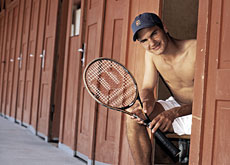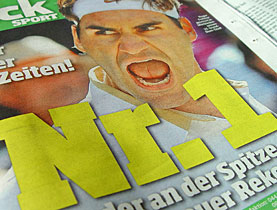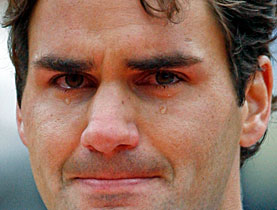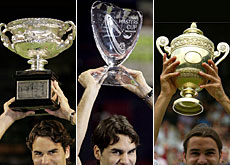From teenage tantrums to sublime success

In 1997 Roger Federer was a talented but combustible 16-year-old. Six years later he fell to his knees on Wimbledon's Centre Court having achieved a childhood dream.
The development of one of the most awe-inspiring players the world has ever seen has involved little blood, a lot of toil and sweat and many tears.
Federer has never been extrovert or arrogant but he was always ambitious. As a 15-year-old at the Swiss National Tennis Centre at Ecublens, he had to write down his sporting goals. While others wanted to “turn professional” or “make the top 100”, Federer said he wanted to “break the top ten and then become number one”.
“I believe Roger is ambitious because he isn’t 100 per cent Swiss,” said Seppli Kacovski, Federer’s first coach. “His father is Swiss, and the calmness Roger has comes from his father, but the ambition and willpower come from his mother [who is South African].”
Calmness was not always a Federer trait, however. “I used to throw my racket around like you can’t imagine,” he admitted. “I was getting kicked out of practice sessions non-stop when I was 16.”
When he was 17, he decided to see a sports psychologist, who helped move him from the explosive McEnroe end of the psychological spectrum towards the composure of Swedish legend Björn Borg.
One difference with Borg, however, is Federer’s reaction to success. “There are people who don’t smile when they win, and there are people who smile for weeks afterwards. I’m the kind of guy who lets the tears flow,” Federer said after winning his first Wimbledon title.
Breakthrough
Federer had been making steady progress – becoming Swiss junior champion in 1997, winning Junior Wimbledon in 1998 – but the world really sat up when he beat seven-time champion Pete Sampras in the fourth-round of Wimbledon in 2001, the only time the two met.
He continued moving up the rankings and on July 6, 2003 became the first Swiss man to win a grand slam title when he beat Mark Philippoussis in straight sets at Wimbledon.
“I think the key point [in Federer’s career] is everything that happened at the beginning of 2004 – after he won Wimbledon in 2003 he won the Tennis Masters Cup, he won the Australian Open in 2004 and got to number one,” René Stauffer, author of “Quest for perfection: The Roger Federer Story”, told swissinfo (listen to audio).
“It was like a big liberation for him. He said that at that point he could have stopped playing since he had achieved everything he wanted. Everything that has happened since then has been like a bonus for him.”
Secrets of success
Stauffer describes Federer as “a puzzle that took a long time to finish but now everything is that much more beautiful”.
“He has everything he needs – he is the complete package now. He has the mental strength and athletic abilities which are just wonderful to watch,” he said.
“It’s no wonder he’s been voted World Sportsman of the Year three times [in 2008 he made it four times] – that shows he’s not only a tennis player but also a sportsman that could probably go far in many other sports.”
This echoes comments by Kacovski: “I’m personally convinced that if he’d chosen football, he’d have made it to the Swiss national team.”
Stress-resistant
Federer’s mental strength – his ability to cope with pressure and even thrive on it – has also played a huge role in his success.
“Everybody has their threshold for pressure moments – but what’s a pressure moment for some low-level player is not going to be a pressure situation for Roger,” Roland Carlstedt, a clinical psychologist and chairman of the American Board of Sport Psychology, told swissinfo (listen to audio).
After winning the Dubai Open for the fourth time in 2007, Federer said: “Previously I always thought it was just tactical and technique, but every match has become almost mental and physical – I try to push myself to move well. I try to push myself not to get upset and stay positive, and that’s what my biggest improvement is over all these years. Under pressure I can see things very clearly.”
Carlstedt doesn’t think things are looking good for Federer’s rivals.
“Roger’s just got it all – when you have the technical, physical and athletic foundation that he has, that’s probably three-quarters of the battle. Add to that the immense confidence that brings, along with the very strong athlete’s [psychological] profile that I think he fits, and he’s virtually unbeatable.”
“Happy period”
Further bad news for Federer’s rivals is that he’s certainly not ready to stop at a record 17 grand slam titles.
Nevertheless, he thinks his run of success in mid-2009 is about as good as it gets: a first French Open title to complete a career grand slam and tie Pete Sampras with 14 major championships, followed immediately by a sixth Wimbledon trophy for number 15.
“I don’t know if I’ve had a more happy period in my tennis life. I don’t know if I can ever top this,” Federer said at the All England Club on July 6, 2009, less than 24 hours after beating Andy Roddick in a 77-game classic final.
“These last months, with all the records on the line, and coming through both times. Knowing what it means to me, it’s quite amazing.”
Roger Federer’s ATP world ranking (at the beginning of the year):
1999 – 302
2000 – 64
2001 – 29
2002 – 13
2003 – 6
2004 – 2
2005 – 1
2006 – 1
2007 – 1
2008 – 1
2009 – 2
2010 – 1
2011 – 2
2012 – 3
Date of birth: August 8, 1981
Height: 185cm
Weight: 85kg
Plays: Right-handed, single-handed backhand
Turned pro: 1998
Shoes: Nike Air Zoom Vapor V
Racket: Wilson [K]Six-One Tour
Clothing: Nike
(As of July 17, 2012)
Singles record: 853 wins, 192 losses
Singles titles: 75 (including 17 grand slam titles)
Career prize money: $72,918,077
Roger Federer was born on August 8, 1981 in Binningen, canton Basel Country, to Swiss-German Robbie and South African Lynette Federer. He grew up in nearby Münchenstein. His sister, Diana, is 20 months older than him and is a nurse.
Robbie Federer used to work for Basel-based chemicals firm Ciba-Geigy and in 1970 met Lynette at the company’s plant in South Africa, just outside Johannesburg. Both now work for Roger Federation Management.
In April 2009 Federer married Miroslava “Mirka” Vavrinec, a former professional tennis player who retired in 2002 after a foot injury. Vavrinec was born in what is now Slovakia but moved to Switzerland when she was two. The pair met at the 2000 Sydney Olympics and Vavrinec is now Federer’s manager.
On July 23, 2009 Federer and Vavrinec announced the birth of twin girls, Charlene Riva and Myla Rose.
According to his website, Federer’s hobbies include “cards, sitting on the beach, cricket and table tennis”. He is also known to be an avid PlayStation and football fan.
Federer speaks three languages: German, French and English, although his mother tongue – but not his mother’s tongue – is Swiss German.
In July 2008 Federer moved from Oberwil, canton Basel Country, where he had lived for around three years, to the “tax paradise” of Wollerau in canton Schwyz, central Switzerland, overlooking Lake Zurich. His training base is in Dubai.

In compliance with the JTI standards
More: SWI swissinfo.ch certified by the Journalism Trust Initiative




You can find an overview of ongoing debates with our journalists here . Please join us!
If you want to start a conversation about a topic raised in this article or want to report factual errors, email us at english@swissinfo.ch.